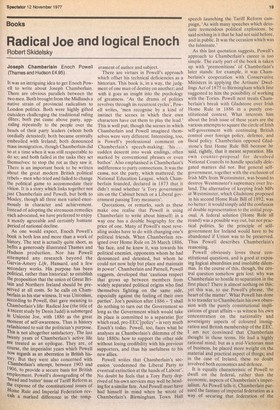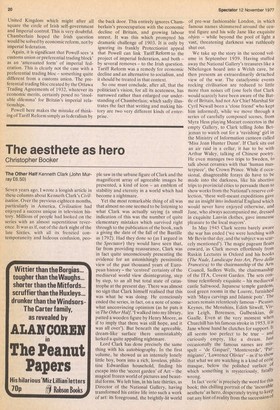Books
Radical Joe and logical Enoch
Robert Skidelsky
Joseph Chamberlain Enoch Powell (Thames and Hudson £4.95) It was an intriguing idea to get Enoch Powell to write about Joseph Chamberlain. There are obvious parallels between the two men. Both brought from the Midlands a native strain of provincial radicalism to London politics. Both were highly gifted outsiders challenging the traditional ruling elites; both put cause above party, appealing repeatedly to the people over the heads of their party leaders (whom both cordially detested); both became centrally embroiled with Ireland; both denounced mass immigration, though Chamberlain did so at a time when it was still respectable to do so; and both failed in the tasks they set themselves: to stop the rot as they saw it. There is an important book to be written about the great modern British political rebels — men who tried and failed to change the political game to accommodate their vision. It is a story which links together not Just Chamberlain and Powell, but both to Mosley, though all three men varied enormously in character and achievement. Instead of adopting the strenuous remedies each advocated, we have preferred to enjoy a mostly agreeable and certainly humane period of national decline.
As one would expect, Enoch Powell's book is both less and more than a work of history, The text is actually quite short, as befits a generously illustrated Thames and Hudson production. Nor has Powell attempted any research beyond the Garvin-Amery Life, Hansard, and a few secondary works. His purpose has been Political, rather than historical: to establish the proposition that the union of Great Britain and Northern Ireland should be preserved at all costs. So he calls on Chamberlain as his star witness. It was Unionism, according to Powell, that gave meaning to Chamberlain's life: Radical Joe (the title of .a recent study by Denis Judd) is submerged in Unionist Joe, with 1886 as the great moment of self-awareness. Thus is history refashioned to suit the politician's purpose. This is not altogether satisfactory. The last twenty years of Chamberlain's active life are treated as an epilogue. They are, of Course, the imperialist years which Powell how regards as an aberration in British history. But they were also concerned with Chamberlain's attempt, between 1903 and 1906, to provide a secure basis for British !mployment. Powell's downgrading of the bread and butter' issue of Tariff Reform at the expense of the constitutional issues of Home Rule and Imperial Federation rev. eals a marked difference in the temp erament of author and subject.
There are virtues in Powell's approach which offset his technical deficiencies as a historian. This book is, in a way, the judgment of one man of destiny on another; and with it goes an insight into the psychology of greatness. 'As the drama of politics revolves through its recurrent cycles', Powell writes, 'men recognise by a kind of instinct the scenes in which their own characters have cut them to play the lead.' This is well put; though the scenes in which Chamberlain and Powell imagined themselves were very different. Interesting, too, is Powell's professional comment on Chamberlain's speech-making: 'his . . . sudden descent into weak endings, often marked by conventional phrases or even bathos'. Also emphasised is Chamberlain's indifference to party connections. It was the cause, not the party, which mattered; the National Education League, which Chamberlain founded, declared in 1873 that it didn't mind whether 'a Tory government sits on the Cabinet bench or a Liberal government passing Tory measures'.
Quotations, or remarks, such as these make one realise that Powell is using Chamberlain to write about himself: in a way one has a double biography for the price of one. Many of Powell's most revealing asides have to do with changing one's political friends. When Chamberlain resigned over Home Rule on 26 March 1886, 'his face, and he knew it, was towards his political enemies, opponents whom he had denounced and detested, but whom he could not now help but place and maintain in power'. Chamberlain and Parnell, Powell suggests, developed that 'cautious respect that grows up between members from widely separated political origins who find themselves fighting on the same side, especially against the feeling of their own parties'. Joe's position after 1886— 'I shall do nothing to turn out the Government so long as the Government which would take its place is committed to a separatist 'for which read, pro-EEC policy' — is very much Enoch's today. Powell, too, faces what he analyses as Chamberlain's dilemma of the late 1880s:. how to support the other side without losing credibility with his previous supporters, and thus his usefulness to his new allies.
Powell writes that Chamberlain's secession 'condemned the Liberal Party to eventual extinction at the hands of Labour'. No doubt he feels that a Tory Party deprived of his own services may well be heading for a similar fate. And Powell must have had himself in mind when he wrote of Chamberlain's Birmingham Town Hall speech launching the Tariff Reform campaign, 'As with many speeches which detonate tremendous political explosions, he said nothing in it that he had not said before, and in public. It was the occasion which was the fulminate.'
As this last quotation suggests, Powell's approach to Chamberlain's career is too simple. The early part of the book is taken up with 'premonitions' of Chamberlain's later stands: for example, it was Chamberlain's cooperation with Conservative Ministers in applying the Artisans' Dwellings Act of 1875 to Birmingham which first suggested to him the possibility of working with the Tories. Powell .next treats Chamberlain's break with Gladstone over Irish Home Rule in 1886 in a purely constitutional context. What interests him about the Irish issue of these years are the various attempts to square the circle of Irish self-government with continuing British control over foreign policy, defence, and fiscal policy. Chamberlain opposed Gladstone's first Home Rule Bill because he said, rightly, that it meant separation. His own counter-proposal for devolved National Councils to handle specially delegated matters did not. But general selfgovernment, together with the exclusion of Irish MPs from Westminster, was bound to destroy Westminster's supremacy over Ireland. The alternative of keeping Irish MPs at Westminster, which Gladstone proposed in his second Home Rule Bill of 1892, was no better: it would simply add the confusion of double representation to the initial proposal. A federal solution (Home Rule all round) was a possible way out, but not practical politics. So the principle of selfgovernment for Ireland would have to be abandoned if Union was to be preserved. Thus Powell describes Chamberlain's reasoning.
Powell obviously loves these constitutional questions, and is good at exposing logical absurdities and insoluble dilemmas. In the course of this, though, the central question somehow gets lost: why was Chamberlain so hostile to separation in the first place? There is almost nothing on this; yet this was, to use Powell's phrase, 'the heart of the matter'. What Powell has done is to transfer to Chamberlain his own obsession with the purely constitutional implications of great affairs — as witness his own concentration on the nationality and sovereignty aspects of coloured immigration and British membership of the EEC. I am not convinced that Chamberlain thought in those terms. He had a highly rational mind; but as a mid-Victorian man of business, he placed more weight on the material and practical aspect of things; and in the case of Ireland, these no doubt involved both economics and defence.
It is equally characteristic of Powell to dwell on the federal, rather than the economic, aspects of Chamberlain's imperialism. As Powell tells it, Chamberlain pursued the fantasy Of imperial federation as a way of securing that federation of the United Kingdom which might after all square the circle of Irish self-government and Imperial control. This is very doubtful. Chamberlain hoped the Irish question would be solved by economic reform, not by imperial federation.
Again, it is significant that Powell sees 'a customs union or preferential trading block' as an `attenuated form' of imperial federation. This is clearly not the case with a preferential trading bloc — something quite different from a customs union. The preferential trading bloc created by the Ottawa Trading Agreements of 1932, whatever its economic merits, certainly posed no 'insoluble dilemma' for Britain's imperial relationships.
Powell here makes the mistake of thinking of Tariff Reform simply as federalism by the back door. This entirely ignores Chamberlain's preoccupation with the economic decline of Britain, and growing labour unrest. It was this which prompted his dramatic challenge of 1903. It is only by ignoring its frankly Protectionist appeal that Powell can link Tariff Reform to the project of imperial federation, and both — by several removes — to the Irish question. Tariff Reform was a remedy for economic decline and an alternative to socialism, and it should be treated in that context.
So one must conclude, after all, that the politician's vision, for all its acuteness, has narrowed rather than enlarged our understanding of Chamberlain; which sadly illustrates the fact that writing and making history are two very different kinds of enterprise.



































 Previous page
Previous page